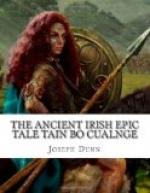Then it was also that the men of Erin said it would be no disgrace for Amargin to leave the camp and quarters, and that the hosts would retire a day’s march back to the north again, there to stop and stay, and for him to quit his feats of arms upon the hosts until such time as he would meet them on the day of the great battle when the four grand provinces of Erin would encounter at Garech and Ilgarech in the battle of the Raid for the Kine of Cualnge. Amargin accepted that offer, and the hosts proceeded a day’s march back to the northwards again. Wherefore the ‘Deer-stalking’ of Amargin in Taltiu [6]is the name of this tale.[6]
[6-6] Stowe.
* * * * *
[Page 298]
XXIV
THE REPEATED WARNING OF SUALTAIM
[1]Now while the deeds we have told here were being done,[1] [W.4685.] Sualtaim (’Goodly fosterer’) son of Becaltach (’of Small belongings’) son of Moraltach (’of Great belongings’), the same the father of Cuchulain macSualtaim, [2]of Sualtaim’s Rath in the plain of Murthemne,[2] was told of the distress and [3]sore wounding[3] of his son contending in unequal combat on the Cualnge Cattle-spoil, even against Calatin Dana (’the Bold’) with his seven and twenty[a] sons, and against Glass son of Delga, his grandson, [4]and at the last against Ferdiad son of Daman.[4]
[1-1] YBL. 43b, 38-39.
[2-2] YBL. 43b, 39-40.
[3-3] Stowe.
[a] ‘Twelve,’ YBL. 43b, 41.
[4-4] Stowe.
[5]It is then that Sualtaim said[5]: “Whate’er it be, [6]this that I hear[6] from afar,” quoth Sualtaim, “it is the sky that bursts or the sea that ebbs or the earth that quakes, or is it the distress of my son overmatched in the strife on the Driving of the Kine of Cualnge?”
[5-5] Stowe and YBL. 43b, 42.
[6-6] Stowe.
In that, indeed, Sualtaim spoke true. And he went to learn all after a while, without hastening on his way. And when Sualtaim was come to where [7]his son[7] Cuchulain was [8]and found him covered with wounds and bloody gashes and many stabs,[8] Sualtaim began to moan and lament [9]for Cuchulain.[9]
[7-7] YBL. 43b, 46.
[8-8] Stowe.
[9-9] Stowe.
[W.4695.] Forsooth Cuchulain deemed it neither an honour nor glory that Sualtaim should bemoan and lament him, for Cuchulain knew that, wounded and injured though he was, Sualtaim would not be [1]the man[1] to avenge his wrong. For such was Sualtaim: He was no mean warrior and he was no mighty warrior, but only a good, worthy man was he. “Come, my father Sualtaim,” said Cuchulain; [2]"cease thy sighing and mourning for me, and[2] do thou go to Emain [3]Macha[3] to the men of Ulster and tell them to come now to have a care for their droves, for no longer am I able to protect them in the gaps




